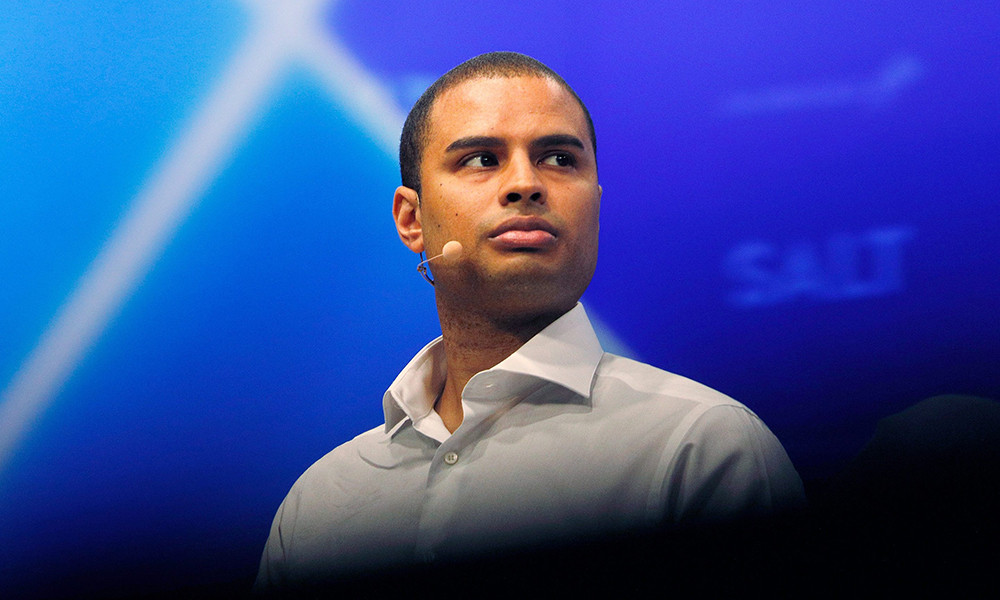
据《财富》杂志最先报道,Yieldstreet将收购房地产投资平台Cadre。Cadre的经营宗旨是实现投资民主化,尤其是在商业地产领域。在被Yieldstreet收购后,Cadre创始人兼首席执行官瑞恩·威廉姆斯的职务不变,同时将担任Yieldstreet全球机构合作伙伴与客户部门的负责人,这个新部门旨在扩大机构客户群体的规模。
两家公司拒绝披露收购价格,但它们表示,其总投资价值超过97亿美元,投资者在两家公司的平台上配置的资金高达53亿美元,迄今为止的回报高达31亿美元。这笔交易还需要通过监管审查,两家公司的目标是成为房地产和另类投资行业的领先企业。据《福布斯》报道,Cadre从Thrive Capital、安德森霍洛威茨(Andreessen Horowitz)、柯斯拉风险投资公司(Khosla Ventures)等机构融资1.33亿美元,其最近的估值为8亿美元。
威廉姆斯此前曾对《财富》杂志表示,他到亚特兰大一个黑人聚集的地区访问好友后,产生了创建Cadre的想法。他在接受本文采访时表示,房地产市场崩溃一年后,街上的所有房子几乎已经或正在被空置待售。他和几位同学以及其他几人以辛迪加的形式,募款收购独栋住宅然后出租,尤其是租给那些自己房子被止赎的人。他说,公司有许多成功的案例,甚至有人买回了自己的房子。
后来,2014年成立的Cadre引起轰动,因为这家初创公司允许个人只需要25,000美元就能参与商业地产投资。五年后,Cadre迎来了一个里程碑。当时,该公司卖掉了在芝加哥和亚特兰大郊区的两套公寓,向投资者返还了1亿美元。《财富》杂志最先报道了这则消息。现在,威廉姆斯表示,该公司平台上的资产净值超过45亿美元。随着Cadre与比其晚一年成立的另类投资平台Yieldstreet合并,他希望打造一家“业内规模最大的数字另类资产管理公司”。
在与我们通话的时候,Yieldstreet的创始人兼首席执行官迈克尔·魏斯与威廉姆斯一样激动和乐观。魏斯说道:“这笔交易对于整个行业的影响,显然是将催生市场领导者,其规模要比竞争对手大五倍。”
威廉姆斯和魏斯已相识多年,他们有共同的愿景,那就是另类投资应该在个人投资者的投资组合中占更大比重。Cadre的业务重心是房地产,但威廉姆斯一直希望向其他行业扩张。
威廉姆斯表示:“这需要时间,还需要资本和专业知识这些资源。我在进行融资的时候就意识到,我们想要的不只是增长,而是飞速的增长,我们需要一个合作伙伴为我们提供多样化的投资项目,我们可以将这些项目分配给客户,从而保证我们能够应对任何宏观环境或市场环境。我认为Yieldstreet在这方面做得非常出色。”
他们此前曾经讨论过合并的事宜,但现在看起来时机已经成熟,因此他们在今年早些时候决定合并。对于魏斯和Yieldstreet而言,这是一个显而易见的决定,因为两家公司的使命和愿景一致。他表示,这通常是两家公司合并最难做到的地方。
魏斯表示:“合并的动机是为了扩大我们的领先地位,准备进行成功的IPO,打造最出色的业务,用最好的产品给客户最好的体验。”
2023年对于房地产行业而言,毫无疑问是艰难的一年。威廉姆斯说道:“我们一直处于防御模式,但我们仍在非常积极地开展资产管理。我们致力于确保我们的投资组合中,有固定利率债务,对所有浮动利率债务设定上限,并积极与投资者充分沟通其投资组合的状况。”
他补充说,Cadre的投资组合表现良好,因为它以多户型地产作为主要投资对象。他认为,明年,中型房地产(该公司将净值为1,500万至5,000万美元的地产定义为中型房地产)市场有投资机会。威廉姆斯表示,尤其是在多户型地产和工业地产领域,如果业主的债务到期,但其借贷的区域银行陷入困境,这些银行将不支持业主进行再融资,这就是公司的机会所在。威廉姆斯解释称,与Yieldstreet合并将支持Cadre创建一个新基金,“利用这种错位的局面,收购区域银行不愿意发放贷款和业主不得不出售的多户型资产和工业资产。”
魏斯和威廉姆斯都认同过去一年商业地产市场面临的挑战,但他强调未来专注于房地产业务依旧是公司的重中之重。
魏斯表示:“房地产市场有许多人一直在等待更多机会。虽然我们还没有看到大量机会出现,没有看到真正的困境和止赎潮,没有以令人兴奋的价格易手的资产,但我们预计这种机会将很快到来。”(财富中文网)
翻译:刘进龙
审校:汪皓
据《财富》杂志最先报道,Yieldstreet将收购房地产投资平台Cadre。Cadre的经营宗旨是实现投资民主化,尤其是在商业地产领域。在被Yieldstreet收购后,Cadre创始人兼首席执行官瑞恩·威廉姆斯的职务不变,同时将担任Yieldstreet全球机构合作伙伴与客户部门的负责人,这个新部门旨在扩大机构客户群体的规模。
两家公司拒绝披露收购价格,但它们表示,其总投资价值超过97亿美元,投资者在两家公司的平台上配置的资金高达53亿美元,迄今为止的回报高达31亿美元。这笔交易还需要通过监管审查,两家公司的目标是成为房地产和另类投资行业的领先企业。据《福布斯》报道,Cadre从Thrive Capital、安德森霍洛威茨(Andreessen Horowitz)、柯斯拉风险投资公司(Khosla Ventures)等机构融资1.33亿美元,其最近的估值为8亿美元。
威廉姆斯此前曾对《财富》杂志表示,他到亚特兰大一个黑人聚集的地区访问好友后,产生了创建Cadre的想法。他在接受本文采访时表示,房地产市场崩溃一年后,街上的所有房子几乎已经或正在被空置待售。他和几位同学以及其他几人以辛迪加的形式,募款收购独栋住宅然后出租,尤其是租给那些自己房子被止赎的人。他说,公司有许多成功的案例,甚至有人买回了自己的房子。
后来,2014年成立的Cadre引起轰动,因为这家初创公司允许个人只需要25,000美元就能参与商业地产投资。五年后,Cadre迎来了一个里程碑。当时,该公司卖掉了在芝加哥和亚特兰大郊区的两套公寓,向投资者返还了1亿美元。《财富》杂志最先报道了这则消息。现在,威廉姆斯表示,该公司平台上的资产净值超过45亿美元。随着Cadre与比其晚一年成立的另类投资平台Yieldstreet合并,他希望打造一家“业内规模最大的数字另类资产管理公司”。
在与我们通话的时候,Yieldstreet的创始人兼首席执行官迈克尔·魏斯与威廉姆斯一样激动和乐观。魏斯说道:“这笔交易对于整个行业的影响,显然是将催生市场领导者,其规模要比竞争对手大五倍。”
威廉姆斯和魏斯已相识多年,他们有共同的愿景,那就是另类投资应该在个人投资者的投资组合中占更大比重。Cadre的业务重心是房地产,但威廉姆斯一直希望向其他行业扩张。
威廉姆斯表示:“这需要时间,还需要资本和专业知识这些资源。我在进行融资的时候就意识到,我们想要的不只是增长,而是飞速的增长,我们需要一个合作伙伴为我们提供多样化的投资项目,我们可以将这些项目分配给客户,从而保证我们能够应对任何宏观环境或市场环境。我认为Yieldstreet在这方面做得非常出色。”
他们此前曾经讨论过合并的事宜,但现在看起来时机已经成熟,因此他们在今年早些时候决定合并。对于魏斯和Yieldstreet而言,这是一个显而易见的决定,因为两家公司的使命和愿景一致。他表示,这通常是两家公司合并最难做到的地方。
魏斯表示:“合并的动机是为了扩大我们的领先地位,准备进行成功的IPO,打造最出色的业务,用最好的产品给客户最好的体验。”
2023年对于房地产行业而言,毫无疑问是艰难的一年。威廉姆斯说道:“我们一直处于防御模式,但我们仍在非常积极地开展资产管理。我们致力于确保我们的投资组合中,有固定利率债务,对所有浮动利率债务设定上限,并积极与投资者充分沟通其投资组合的状况。”
他补充说,Cadre的投资组合表现良好,因为它以多户型地产作为主要投资对象。他认为,明年,中型房地产(该公司将净值为1,500万至5,000万美元的地产定义为中型房地产)市场有投资机会。威廉姆斯表示,尤其是在多户型地产和工业地产领域,如果业主的债务到期,但其借贷的区域银行陷入困境,这些银行将不支持业主进行再融资,这就是公司的机会所在。威廉姆斯解释称,与Yieldstreet合并将支持Cadre创建一个新基金,“利用这种错位的局面,收购区域银行不愿意发放贷款和业主不得不出售的多户型资产和工业资产。”
魏斯和威廉姆斯都认同过去一年商业地产市场面临的挑战,但他强调未来专注于房地产业务依旧是公司的重中之重。
魏斯表示:“房地产市场有许多人一直在等待更多机会。虽然我们还没有看到大量机会出现,没有看到真正的困境和止赎潮,没有以令人兴奋的价格易手的资产,但我们预计这种机会将很快到来。”(财富中文网)
翻译:刘进龙
审校:汪皓
Yieldstreet is acquiring Cadre, a real estate investment platform with a mission to democratize access to investing, particularly in commercial real estate, Fortune is the first to report. Cadre’s founder and chief executive, Ryan Williams, will remain at the helm as the company operates under the Yieldstreet umbrella—while leading a new division focused on broadening access to the institutional audience as Yieldstreet’s global head of institutional partnerships & clients.
The companies declined to release the purchase price, but the two have a collective investment value of over $9.7 billion and investors that have allocated $5.3 billion on their platforms—notching $3.1 billion in returns to date, they say. While the transaction is subject to regulatory review, their goal is to become a leader across the real estate and alternatives investment industry. Cadre has raised $133 million from Thrive Capital, Andreessen Horowitz, Khosla Ventures and others; its latest valuation was $800 million, according to Forbes.
Williams previously told Fortune that his idea to launch Cadre came after visiting his best friend in a predominantly Black part of Atlanta. In an interview today, Williams told me that a year after the housing crash, almost every other home lining the streets were boarded up, or being boarded up. He and some classmates along with others raised money in a syndication format to buy single-family homes and rent them out, particularly to the people whose homes had been foreclosed upon. Some success stories even included those people buying their homes back, he said.
That was all before Cadre launched in 2014, making waves as a startup that allowed individuals to invest in commercial real estate for as little as $25,000. Five years later, Cadre hit a milestone, returning $100 million to its investors after selling two apartment complexes in the Chicago and Atlanta suburbs, as Fortune first reported at the time. Now, the company has slightly more than $4.5 billion in total asset value on its platforms, Williams said—and with Cadre’s partnership with Yieldstreet, an alternative investment platform that launched just a year after Cadre, he hopes they can build what will be the “largest digital alternative asset manager in the industry.”
Yieldstreet’s founder and chief executive, Michael Weisz, shared Williams’ excitement and optimism on our call. “What this transaction does for the industry is clearly define a market leader by a factor of five,” Weisz said.
Williams and Weisz have known each other for years, sharing the same visions that alternative investments need to be a bigger part of individual investors’ portfolios. Cadre did things differently, focusing on real estate, but Williams has always wanted to move beyond the sector.
“That takes time and that takes resources—capital and expertise,” Williams said. “I recognized while we were in the midst of closing a fundraise, that we wanted to not just grow but grow exponentially, and we were going to need to find a partner who offered us diversified investments that we could distribute to our clients in a way that would ensure we were able to navigate any macro or market environment, and I think that’s one of the things Yieldstreet has done incredibly well.”
They’d had previous discussions about combining forces, but the time seemed to be right, so they connected earlier this year to make it happen. For Weisz, and Yieldstreet, it was an obvious decision because there’s an alignment between both companies’ mission and vision—which he said, is typically the hardest part when it comes to bringing two teams together.
“That’s the motivation, to extend our leadership, to set us up for a successful IPO, to build the best business, to serve our customers with the best experience with the best investment product,” Weisz said.
No question it’s been a tough year for real estate. “We’ve been in defense mode,” Williams said, “but we’ve been very proactive on asset management. We’ve made sure that across our portfolio, we had fixed-rate debt in place, we put caps on all of our floating-rate debt, and we’ve been focused on over-communicating with investors about the status of their portfolios.”
Cadre’s portfolio has held up well, he added, because it’s weighted toward multifamily. In the next year, he sees opportunity in mid-cap real estate (properties with $15 to $50 million of equity in total value, in the company’s view). That’s especially true for multifamily and industrial properties with debt coming due, Williams said, to distressed regional banks that won’t allow owners to refinance. This deal with Yieldstreet will allow Cadre to create a new fund that will “capitalize on these dislocations and acquire multifamily and industrial assets that these regional banks are not going to extend loans around, that sellers will be forced to sell,” Williams explained.
Weisz echoed Williams on the challenges surrounding commercial real estate over the past year, while stressing that it’s a priority to focus on real estate moving forward
“A lot of us in the market have been waiting for more opportunities to bubble up,” Weisz said. “We haven’t yet seen a flurry of opportunity come, true distress and true foreclosures, or assets that are really changing hands at prices that seem to be exciting—but we expect that it will come soon.”






